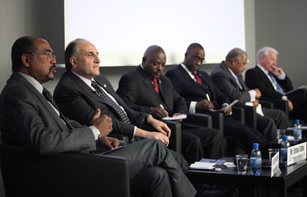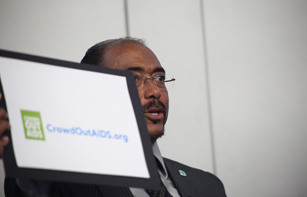
UNAIDS Executive Director Michel Sidibé participating at the “Megabits and MDGs" session of the Broadband Leadership Summit.
Credit: ITU
There is broad agreement that information and communication technologies (ICTs) can accelerate progress towards achieving the Millennium Development Goals (MDGs). But questions remain on how to scale up both access and content. This was the topic at hand for a plenary session at the Broadband Leadership Summit held in Geneva on 24-25 October 2011.
At the "Megabits and MDGs" session, President Pierre Nkurunziza of Burundi raised the issue of fostering partnerships to reach the country’s citizens with broadband access. According to President Nkurunziza, this would help accelerate e-government, e-learning, e-health and e-commerce.
His thoughts were echoed by Commodore Josaia Voreqe Bainimarama, Prime Minister of the Republic of Fiji faced with the task of reaching 890 000 people spread across 110 islands where “Broadband becomes a solution to overcome the challenge of distance.”
For Klaus Leisinger, President and CEO of the Novartis Foundation, broadband allows for more democratic access to knowledge.
It is absolutely critical that we engage youth at this level, not as recipients of our messages but the actors and creators of change. In this global movement we need more global citizens
UNAIDS Executive Director Michel Sidibé
Osman Sultan, CEO of Du, an integrated telecommunications company based in United Arab Emirates said that ICTs have become a basic human need and a basic human right. Mr Sultan stressed that old business plans would not work in this new ecosystem. “No one owns the customer,” he said while talking about how one can build a platform but the customers will decide how to use it.
The summit was organized by the International Telecommunication Union (ITU) and the Broadband Commission for Digital Development under the theme "Broadband for the Global Good". It explored how broadband infrastructure and services can be made to work to the benefit of developing countries.
The Broadband Commission on Digital Development
The Broadband Leadership Summit brought together a number of leading industry heads, various heads of state and governments, the heads of a number of international organizations and members of the ITU/UNESCO Broadband Commission for Digital Development.

UNAIDS Executive Director Michel Sidibé launching a new initiative run by young people, for young people, called “Crowd Out AIDS”
Credit: ITU
At the Summit, UNAIDS Executive Director Michel Sidibé launched a new initiative run by young people, for young people, called “Crowd Out AIDS”. Engaging through the most popular social media sites around the world and a Wiki platform, the UNAIDS Secretariat will ask young leaders to draft its new youth HIV strategy, debate, and then work with UNAIDS to implement it. It aims to reach more than 100 000 young people with the opportunity to input their ideas.
"It is absolutely critical that we engage youth at this level, not as recipients of our messages but the actors and creators of change," Mr Sidibé said. "In this global movement we need more global citizens.”
The Broadband Commission was established by ITU and UNESCO in May 2010 based on the increased belief that expanding broadband access in every country is key to accelerating progress towards the MGDs.





